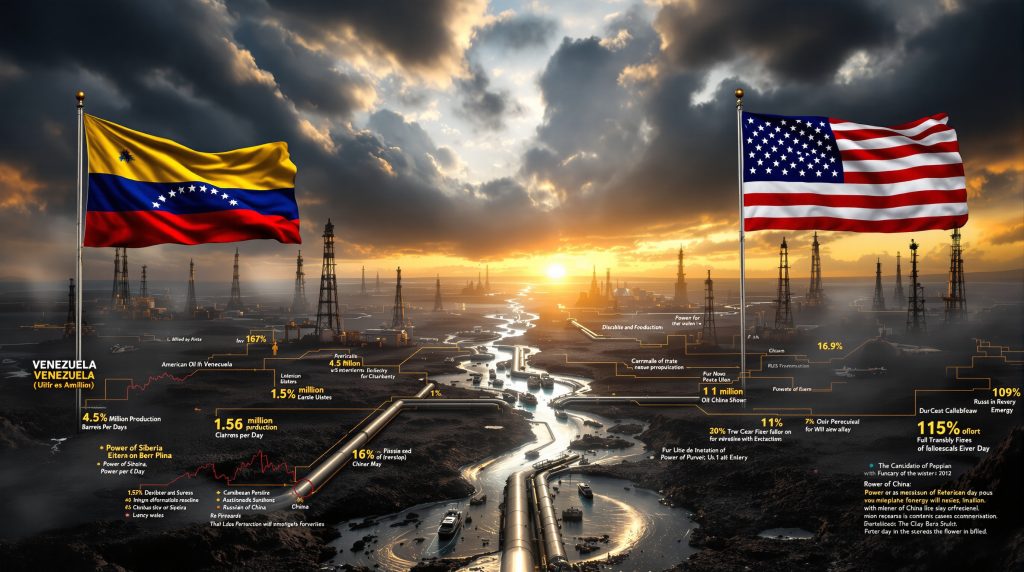Why Is Venezuela’s Oil So Significant on the Global Stage?
Venezuela’s vast hydrocarbon reserves remain central to debates on international energy security, especially amid the US Venezuela oil conflict. Its heavy crude is uniquely compatible with advanced US refineries, which has cemented the country's status as a strategic asset. Furthermore, this reliance fuels policy decisions and market reactions in a turbulent global arena.
Venezuela once produced around 4.5 million barrels per day at its peak, rivaling the largest global producers. However, years of political and economic turmoil reduced output dramatically to near 1 million barrels per day. Consequently, the global market experienced rapid shifts, leading to rising concerns about supply security.
Recent international developments, including changing geopolitical alliances, have further complicated the picture. For instance, market indicators suggest frequent episodes of an
oil price rally amid renewed tensions. Analysts also note that the unpredictable behaviour of global crude markets is both a symptom and a cause of investment uncertainty.
How Does Venezuela’s Resource Wealth Shape Regional Dynamics?
Neighboring states, especially Guyana and Colombia, have felt the impacts of Venezuela’s resource wealth. Multinational firms are flocking to the wider Caribbean for opportunities amid high expectations of booming output. Moreover, regional disputes, such as border tensions with Guyana, continue to test diplomatic relations.
Local economies have been reshaped by the influx of resource-related investments. Political alliances in Caribbean nations now have to balance economic prospects against environmental and security concerns. In addition, criminal networks exploiting the lucrative oil trade further complicate these dynamics, urging regional policymakers to re-evaluate public safety measures.
How Have US Policies Toward Venezuela Shifted Over Time?
US policy regarding Venezuela has experienced significant fluctuations over the decades. The US has alternated between engagement and confrontation, particularly when it comes to safeguarding its energy interests. Recent naval and aerial deployments in the Caribbean illustrate this dichotomy.
The US approach has notably incorporated environmental and counter-narcotics rhetoric alongside its energy strategy. For example, some military actions—such as the reported destruction of Venezuelan vessels—coincide with aggressive measures to secure oil assets. These dual motives exemplify how domestic energy policy has become intertwined with broader geopolitical ambitions.
What Characterises the US Approach to Venezuelan Oil Interests?
US military and diplomatic strategies increasingly reflect a desire to regain leverage over Venezuela’s oil sector. The deployment of naval forces—heightened by recent
naval movements—signalled renewed assertiveness in the region. However, it is not solely military might; economic sanctions and political isolation have also featured prominently.
Analysts believe that the persistent focus on energy security may propel the US towards a more interventionist stance. In addition, decisions on whether to sanction, engage, or negotiate are informed by constantly shifting market conditions and global alliances.
How Do Drug Cartels and ‘Energy Pirates’ Factor Into the Picture?
Criminal syndicates have found fertile ground amid Venezuela’s chaotic energy sector. Cartels and other underground groups now control significant portions of local energy flows. They impose illicit transit fees and generate profits rivaling those of some multinational firms. Furthermore, these networks challenge state control and erode formal economic revenues.
Recent estimates suggest that these groups accrue over $1 billion each year, deeply influencing regional security dynamics. Security analysts have noted that the mix of organised crime and energy trade exacerbates the US Venezuela oil conflict, making it a complex and unpredictable challenge.
What Are the Economic and Energy Market Consequences?
Venezuela’s instability sends tremors across global energy markets. Price volatility remains a constant concern as governments struggle to address supply disruptions, policy shifts, and mounting production costs. In addition, fluctuations impact not only global oil prices but also the viability of domestic energy projects in critical regions.
Analysts point out that evolving market forces have led to noticeable shifts. For instance, a significant change in production strategies by major economies has altered traditional break-even calculations. As markets adjust, questions about future growth cycles and sustained output persist, underpinning concerns over economic stability.
Could US Oil Production Trends Affect Policy Toward Venezuela?
The US remains one of the top oil and gas producers. However, the rise of shale production introduced a nuanced pricing dynamic in domestic markets. A notable trend is the recent
US drilling decline, which has forced producers to re-evaluate extraction strategies.
Furthermore, increased emphasis on natural gas has altered profit margins. An unexpected rise in natural gas prices, from negative spot values to around $5/MMBtu, transforms drilling economics. As a result, US producers sometimes view oil as a secondary resource, contributing to a reconfigured energy landscape and strategic recalibrations.
Is the US Still Energy Secure If Venezuela Is Unstable?
Although the US has considerable domestic output, its security is not entirely insulated from international disruptions. Critical infrastructure—especially pipeline networks—remains vulnerable amid increased production and export demands. Consequently, any prolonged Venezuelan instability could send shockwaves across US supply chains, increasing the probability of market imbalances.
In addition, diverse yet geopolitically less reliable import streams have kept US energy policymakers on alert. As changes in Venezuelan output continue, the pressure intensifies on the US to secure consistent and sustainable energy supplies without compromising strategic interests.
How Does the Russia-China Energy Axis Influence the Broader Conflict?
Recent geopolitical shifts have seen stronger ties between Russia and China, redefining global energy alliances. New agreements like the Power of Siberia 2 pipeline are altering energy flows, with up to 5 billion cubic feet per day being redirected from traditional Western markets to the East. This realignment is crucial for global energy stability and has forced Western nations to reconsider their strategies.
The reconfiguration of supply chains has considerable implications for international markets. Price sensitivity is high as nations scramble to balance cost-effective purchases against rapidly shifting supply dynamics. As a result, energy prices remain volatile, echoing trends seen in
oil price dynamics.
Comparisons and Implications for US Policy
Global energy dynamics have been dramatically reshaped by competing alliances. The division between Western nations and blocs like BRICS underscores increasing pressures on US policy. In a sophisticated table of comparisons, the US, Venezuela, Russia, and Saudi Arabia each face distinct challenges, ranging from infrastructure bottlenecks to political instability.
Key highlights include:
• US: Approximately 12 mb/d production with mounting infrastructure challenges.
• Venezuela: Around 1 mb/d amid sanctions and governance issues.
• Russia: Close to 10 mb/d, contending with sanctions and market shifts.
• Saudi Arabia: Roughly 10 mb/d, balancing OPEC+ decisions.
These contrasts force policymakers to consider both internal and external pressures, which may ultimately shape future steps in resolving the US Venezuela oil conflict.
What Are the Political Ramifications Within Venezuela and the US?
Both nations experience substantial political reverberations stemming from energy policies and market pressures. In Venezuela, decades of economic mismanagement and sanctions have weakened the ruling government. Meanwhile, in the US, shifting domestic priorities have spurred debates over energy independence, environmental sustainability, and international intervention strategies.
Indeed, historical lessons from interventions in nations like Iraq and Libya underscore the risks of sudden regime changes. Consequently, future US strategies may lean towards gradual, controlled engagements rather than sweeping political maneuvers that could trigger broader instability.
Can Regime Change Be Achieved Without Escalating Conflict?
The challenges of instigating political transition remain profound. The Maduro government, weakened by economic missteps and external sanctions, faces growing internal dissent. Yet, abrupt attempts at regime change risk unleashing further instability, as witnessed in previous international interventions.
Policy experts advise caution, stressing that inflection points in the US Venezuela oil conflict should be managed through measured diplomatic dialogue rather than rapid military escalation. This approach aims to prevent the inadvertent empowerment of militias or criminal enterprises that thrive in power vacuums.
How Might US Domestic Politics Shape Future Engagement?
Domestic political currents in the US significantly influence decisions regarding Venezuela. Shifting allegiances, policy priorities, and election outcomes all bear on the nation’s approach to energy and foreign policy. For instance, campaigns advocating aggressive fossil fuel development have contrasted sharply with those favouring rapid climate action.
These changing perspectives underscore a broader tension in US policy. Navigating these competing priorities remains challenging as leaders balance economic interests with environmental goals. Ultimately, the US Venezuela oil conflict continues to serve as a barometer for larger debates over national sovereignty and international alliances.
What Are the Broader Global Repercussions?
The ripple effects of Venezuelan instability are felt far beyond the Americas. Global markets have experienced unpredictable price swings during periods of heightened tension, with risks of systemic shocks to energy networks. Additionally, regional power struggles compound these pressures, influencing everything from pipeline investments to trade agreements.
Furthermore, ongoing trade disputes have led to observable shifts elsewhere in the market. For example, sectors impacted by
trade war oil impact now face added uncertainty. As nations adapt to volatile economic conditions, the balance of power in global energy remains precarious and uncertain.
Confronting the US Venezuela Oil Conflict: A Glimpse Into the Future
Looking forward, the path to stability in Venezuela’s oil sector is fraught with both domestic and international challenges. Economic recovery depends on deep political reforms, while international consensus remains elusive. Analysts stress that measured policy steps, rather than abrupt interventions, are essential for long-term progress in the US Venezuela oil conflict.
Key future scenarios include:
- Stalemate: Persistent sanctions and slow regime change keeping output depressed.
- Escalation: A more assertive US posture, either directly or through proxies.
- Diplomatic Breakthrough: Gradual lifting of sanctions leading to cautious recovery.
Conclusion: Is Lasting Resolution Possible?
Achieving a sustainable resolution requires addressing complex domestic issues and realigning international interests. The interplay of criminal networks, market volatility, and shifting global alliances continues to define the US Venezuela oil conflict. In this context, policymakers must balance assertive military postures with nuanced diplomatic initiatives for a stable energy future.
The delicate balance of economic pressure and political transformation remains a major challenge. As global stakeholders navigate this intricate landscape, it is clear that measured reform and international cooperation will be pivotal for lasting resolution. Notably, one should recognise that the US Venezuela oil conflict presents enduring dilemmas that demand both vigilance and adaptability.
Lastly, an in-depth understanding of these dynamics is essential. With ongoing debates and divergent strategic interests shaping energy markets, the path forward remains as complex as it is critical to global prosperity.
Curious About How Major Discoveries Impact Markets?
Uncover the critical role Venezuela's oil plays on the global stage and how it can influence market shifts. Enhance your understanding of impactful discoveries by visiting Discovery Alert’s dedicated discoveries page, powered by its proprietary Discovery IQ model, and start your 30-day free trial to stay ahead of the game.




